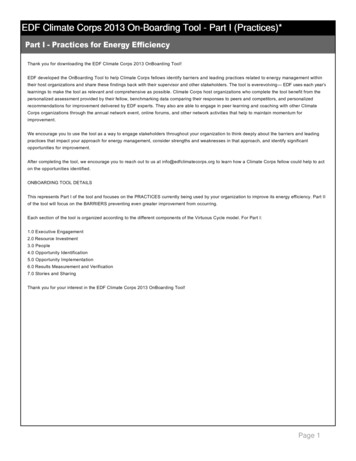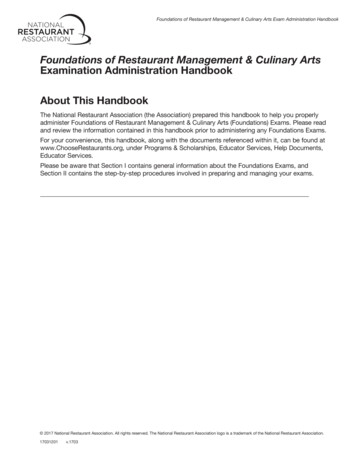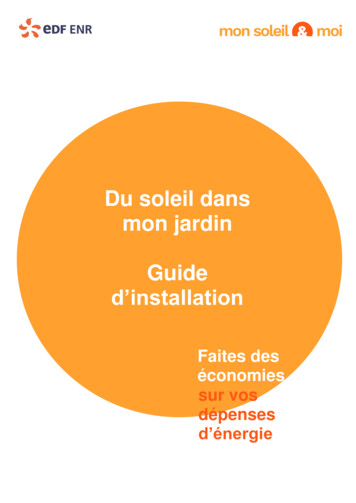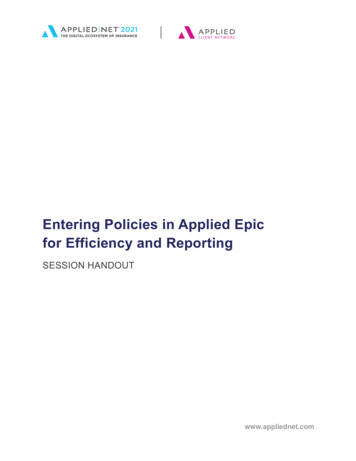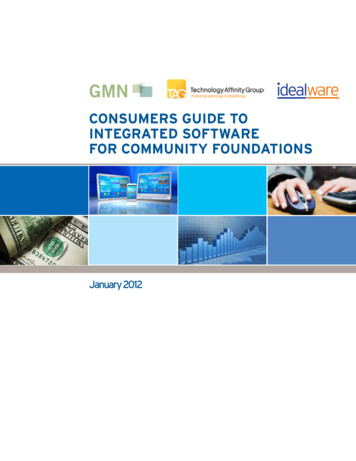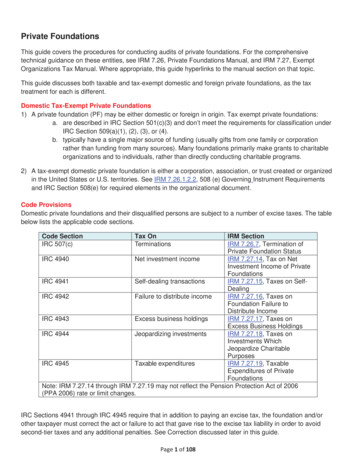
Transcription
EDF 6225 FOUNDATIONS OF APPLIED BEHAVIOR ANALYSIS3 Semester Graduate Course Credit HoursBACB 5th Edition Task List/QABA Competency Standards45 hours in Concepts and Principles of Behavior Analysis (BACB) orCore Principles of ABA (QABA Standards)Syllabus Effective Date: August 1, 2021PrerequisitesStudents must be eligible to enroll in Master’s level courses.Course Description.This course serves as a basic introduction to behavior analytic principles, definitions, characteristics,processes, and concepts. The content is based on the Behavior Analyst Certification Board (BACB) 5th editionTask List and the Qualified Applied Behavior Analysis Credentialing Board (QABA) Qualified Behavior Analyst(QBA) Competency Standards (see below under Topics Covered). This course serves as the first in a series ofcourses that prepares students to apply for the Board Certified Behavior Analyst (BCBA) exam or the BoardCertified Associate Behavior Analyst (BCaBA) exam or the Qualified Behavior Analyst (QBA).Course Format/TypeThis course is 100% Online. Students will be required to participate in weekly online videoconference styleclasses and a celeration chart application. In addition, students are required to access supporting documentsfrom the Internet including the syllabus, assignments, and assessments. Weekly attendance in either live orrecorded sessions is mandatory and proctored using the online educational platform provided by theUniversity of West Florida.Course Learning Outcomes1. Define vocabulary terms related to Concepts and Principles (BACB) and Core Principles of ABA (QABA)located under Topics Covered as evidenced by charting learning celeration of x1.3 via daily by 20second timings of SAFMEDS.2. Provide examples of vocabulary terms to Concepts and Principles (BACB) and Core Principles of ABA(QABA) located under Topics Covered as evidenced by charting learning celeration of x1.3 via daily 20second timings of SAFMEDS.3. Compare and contrast (when appropriate) Concepts and Principles (BACB) and Core Principles of ABA(QABA) located under Topics Covered as evidenced by at least 82% score on discussion post rubrics.4. Distinguish (when appropriate) appropriate use of Concepts and Principles (BACB) and Core Principlesof ABA (QABA) located under Topics Covered as evidenced by 100% acquisition on weekly quizzes.5. Apply Concepts and Principles (BACB) and Core Principles of ABA (QABA) located under Topics Coveredto vignettes in weekly quizzes.6. Synthesize required readings with independently located literature to defend and evaluate conceptsrelated to appropriate Concepts and Principles under Topics Covered, relating to real-life scenarios andexamples as evidenced by at least 82% score on discussion post rubrics.7. Maintain Concepts and Principles (BACB) and Core Principles of ABA (QABA) located under TopicsCovered via cumulative assessments throughout the course sequence.8. Describe the purpose of the BACB requirements, the necessary steps required to meet criteria to testfor certification, and the purpose of the study materials to verify the UWF coursework under BACBstandards.
Topics CoveredBACB Concepts and -13B-14B-15Define and provide examples of behavior, response, and response class.Define and provide examples of stimulus and stimulus class.Define and provide examples of respondent and operant conditioning.Define and provide examples of positive and negative reinforcement contingencies.Define and provide examples of schedules of reinforcement.Define and provide examples of positive and negative punishment contingencies.Define and provide examples of automatic and socially mediated contingencies.Define and provide examples of unconditioned, conditioned, and generalized reinforcers and punishers.Define and provide examples of operant extinction.Define and provide examples of stimulus control.Define and provide examples of discrimination, generalization, and maintenance.Define and provide examples of motivating operations.Define and provide examples of rule-governed and contingency-shaped behavior.Define and provide examples of the verbal operants.Define and provide examples of derived stimulus relations.QABA Core Principles of ABA (B).1Four-term contingency2Phylogenic history vs. ontogenic history3Classical conditioning4Stimulus (e.g., stimulus control, discriminative stimulus, stimulus delta, SD, generalization,discrimination, response)5Motivational operations (e.g., AO, EO, abative, evocative, CMO, and UMO)6Reinforcement and punishment (e.g., positive and negative)7Matching law8Reinforcers and punishers (e.g. primary, secondary, conditioned, unconditioned)9Measurement (e.g., dimensional quantities, derivative measures, and definitional measures)10Schedules of reinforcement11Extinction and effects (e.g., spontaneous recovery, resurgence, extinction burst, renewal)12Verbal operants and extensions13Conditioned motivating operations (i.e., CMO-R, CMO-T, CMO-S)Required Texts and MaterialsCooper, J.O., Heron, T.E., & Heward, W.L. (2019). Applied Behavior Analysis. (3rd ed.). Prentice Hall.PrecisionX. Students will be required to purchase a SAFMEDS training package. Students will beresponsible for charting their daily progress online and the data will be verified several timesthroughout the course via real-time or pre-recorded check-ins with your instructor.Grading SystemPoints will be allocated using the following weighted system1. Participation in weekly assignments (10% of final grade)2. Exams (75% of final grade)3. Final Assignments (15% of final grade)
ExamsAll exams are cumulative and are available on the UWF eLearning system. Computers must be able to take theexam using a lock-down browser.AssignmentsContent hours earned towards BACB requirements and QABA requirements have been carefully calculated. Ifa student neither attends the live virtual class nor views the recorded lectures for each week, a 10% responsecost to the final grade will be administered for each missed session or recording. If 3 or more class sessions aremissed, this will result in an automatic (F) failing grade assigned for the course. Students must also completeweekly assignments to receive a passing grade in the course. Assignments submitted beyond one week fromthe due date will not receive points, but assignments still must be placed in eLearning by the end of the coursein order to earn a passing grade. If any assignments are not submitted to eLearning by the end of course, a10% response cost to the final grade per missing assignment will be administered. If 3 or more assignmentsare missed, this will result in an automatic (F) failing grade assigned for the course.Virtual ClassOur students have choices in attendance and participation: Students are encouraged to attend all live, realtime, class sessions. If students cannot attend live, they must watch the recording each week, in addition toany other pre-recorded lectures.Grading scaleA92-100A90-91B 88-89B82-87 - Grades of 82% or higher are required for courses with prerequisites in the programB80-81C 78-79C72-77C70-71D60-69F59 or belowIncomplete grades (I) will not be given except under very extreme circumstances. Please see the UWF catalogfor rules about Incomplete gradesSpecial Technology RequirementsEach student is expected to activate a MyUWF account and access it 2-3 times per week and access their UWFemail account 2-3 times per week. Students will need broadband internet (laptop or desktop computerpreferred) via a compatible web browser (complete list in Canvas). Students are expected to participate in theonline learning environment by downloading files from Canvas and uploading and attaching files to send toothers. Students will need audio input, built-in, or external computer speakers, as well as an internal orexternal webcam (recommended) in order to actively participate in the on-line live classroom and check ins. Canvas Support Hotline (Open 24/7) - 1-844-866-3349 UWF ITS Help Desk - 1-850-474-2075 or email itshelpdesk@uwf.edu PrecisionX Help Desk - institute-support@centralreach.com
Student Accessibility ResourcesThe University of West Florida supports an inclusive learning environment for all students. If there are aspectsof the instruction or design of this course that hinder your full participation, such as time-limited exams,inaccessible web content, or the use of non-captioned videos and podcasts, reasonable accommodations canbe arranged. Prior to receiving accommodations, you must register with the Student Accessibility Resources(SAR). Appropriate academic accommodations will be determined based on the documented needs of theindividual. For information regarding the registration process, e-mail sar@uwf.edu or call 850.474.2387.Expectations for Academic ConductThe Student Code of Conduct sets forth the rules, regulations, and expected behavior of students enrolled atthe University of West Florida. Violations of any rules, regulations or behavioral expectations may result in acharge of violating the Student Code of Conduct. It is the student’s responsibility to read the Student Code ofConduct and comply with these expectations. The Student Code of Academic Conduct defines various formsof academic misconduct including cheating and plagiarism and describes the process for addressing allegationsof academic misconduct. More information and links to the University regulations governing both studentconduct and academic conduct can be found on the Dean of Students website listed under the Office ofStudent Rights and ResponsibilitiesUWF maintains a university license agreement for an online text matching service called Turnitin. At ourdiscretion, we may use the Turnitin service to evaluate the originality of student papers. We also may employother services and techniques to evaluate your work for evidence of appropriate authorship practices asneeded.Respondus LockDown Browser is a client-based application that "locks down" a computer or device during anonline exam delivered on a third-party assessment platform, such as a Learning Management System (LMS).Privacy information for Respondus LockDown Browser.Respondus Monitor is a companion product for LockDown Browser that enables students to recordthemselves with a webcam and microphone during an online exam. The recordings and other data from theexam session are processed automatically; summary information is provided to the instructor, such as if thestudent left the video frame during the exam session. Privacy information for Respondus Monitor.Military and Veterans’ Resource CenterThe UWF Military & Veterans Resource Center (MVRC) serves as a leading campus advocate for military andveterans students, working to ensure the needs of these individuals are met through coordinating withmultiple university offices and services. The center provides assistance with the following: GI Bill educationbenefits, active-duty tuition assistance, out-of-state fee waiver, tutoring, paper reading, counseling, disabilityaccommodations, coordinating academic advising, and referral to state /federal resources and services. TheMVRC is located in bldg. 38. For more information on MVRC service, call 474-2550Mental Health SupportAt the University of West Florida, we recognize that to learn, thrive, and flourish, you may need a littleassistance. Please take advantage of the free resources online or on campus. For health concerns, contact Student Health Services at (850) 474-2172. For mental health or substance use concerns, contact Counseling and Psychological Services at 850474-2420. For 24/7 crisis counseling, call 850-474-2420 and press option 6.
All students are encouraged to utilize Therapy Assistance Online (TAO) to strengthen skills to cope withanxiety, depression, stress management, and more. TAO is an interactive web-based self-help program that isavailable 24/7. Access TAO anonymously at uwf.edu/tao.If you feel like you need somewhere to talk anonymously to others who can support you, peer support isavailable to all students 24/7 via TogetherAll. TogetherAll is an online community where members areanonymous and can share how they are feeling and support each other. Learn more and join TogetherAll atuwf.edu/togetherallMental Health is one aspect of holistic health, which encompasses all of the eight wellness dimensions. Theeight dimensions do not have to be equally balanced. Instead, you should strive to achieve your own authenticpersonal harmony. You have unique goals, priorities, and aspirations. You determine how to live your best life.ArgoWell is here to help you make the healthy choice, the easy choice, and support you in your wellnessjourney. Meet ArgoWellDiscrimination or Harassment ReportingThe University of West Florida faculty members are committed to supporting students and upholding theUniversity’s non-discrimination and harassment policies. Under Title IX, discrimination and harassment basedupon sex or gender (including sexual violence and sexual misconduct) are prohibited. If you experience anincident of sex/gender-based discrimination or harassment, you do not have to go through the experiencealone. Know that while you may talk to a faculty member, understand that as a "Responsible Employee" ofthe University, the faculty are required to notify the University’s Title IX Coordinator so that support servicescan be provided to you. If you would like to speak with someone confidentially, you may schedule anappointment with the UWF’s Counseling and Psychological Services at (850) 474-2420. This service is free forstudents. Faculty can also help direct you, or you may refer to the University’s Title IX website.Emergency Information and Course Continuity Statement:In the case of severe weather or another emergency, the campus might be closed and classes canceled.Official closures and delays are announced on the UWF website and broadcast on WUWF-FM.
EDF 6225 FOUNDATIONS OF APPLIED EHAVIOR ANALYSIS 3 Semester Graduate Course Credit Hours BACB 5th Edition Task List/QABA Competency Standards 45 hours in Concepts and Principles of Behavior Analysis (BACB) or Core Principles of ABA (QABA Standards) Syllabus Effective Date: August 1, 2021

